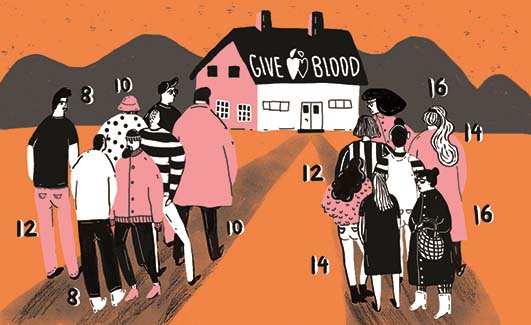Donors could give blood more often
New research shows that some blood donors could safely give blood more frequently than is allowed at present. We hope the results of this research could, in the future, lead to a more personalised donor experience by tailoring donation intervals to suit the individual.
At the moment in the UK men can give blood every 12 weeks, and women every 16 weeks. This new research demonstrates that, for some individuals, a shorter interval between donations is possible, without any detrimental effect on their health.
Illustration: Dessy Baeva
 The INTERVAL study was carried out with Cambridge and Oxford Universities, and involved 45,000 blood donors. The men were randomly assigned to groups giving blood at 8, 10 and 12-week intervals, the women to groups giving blood at 12, 14 or 16-week intervals. INTERVAL donors then donated at their assigned interval for two years, with the aim of determining the impact, if any, on donor health.
The INTERVAL study was carried out with Cambridge and Oxford Universities, and involved 45,000 blood donors. The men were randomly assigned to groups giving blood at 8, 10 and 12-week intervals, the women to groups giving blood at 12, 14 or 16-week intervals. INTERVAL donors then donated at their assigned interval for two years, with the aim of determining the impact, if any, on donor health.
No major impact
The results showed that more units were collected over the 2-year period from the groups of donors on the shorter donation intervals and that, for many, giving more frequently didn’t have a major impact on the donors’ quality of life, mental function or physical activity. However, some of those who gave blood more frequently did report minor symptoms including tiredness and restless legs, and the research suggests this may have been due to giving blood. The study also showed that donors who weighed above average and those with higher initial stores of iron were able to give blood more often.
The INTERVAL study is part of a larger body of work that we are doing to support research in the UK. In collaboration with the National Institute for Health Research (NIHR) Bioresource we are recruiting volunteers from around the UK who are willing to participate in research studies and trials. To find out more, visit the National Institute for Health Research BioResource website.
Thank you
Dr Nicholas Watkins from our Medical and Research team says, “We are extremely grateful to the many blood donors that took part in the trial - their participation has been invaluable in allowing us to make important developments in the world of blood donation.”
In this issue of The Donor magazine
- Improving your experience of donating
- When giving blood is just what the doctor orders!
- Christmas messages
- Why we need more black blood donors
- Winter news
- New steps towards lab-produced platelets
- Let them see what they can only imagine
- Getting on like a house on fire with the fire service
- John donates in style
- Public inquiry into blood safety
- What happens when you give blood
- I just saved my neighbour's life
